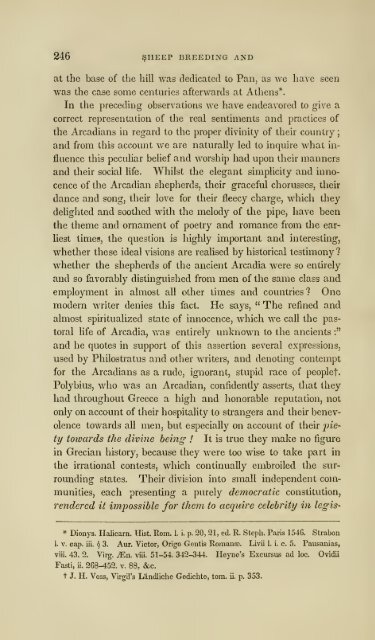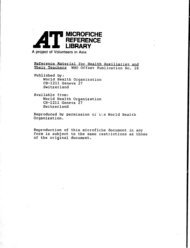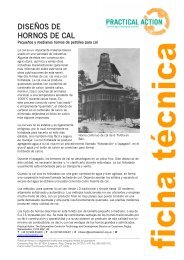- Page 2 and 3:
®{je ^. % ^iU lltbrarg lSV3t6 G48
- Page 7 and 8:
Digitized by the Internet Arciiive
- Page 9:
THE HISTORY OF SILK, COTTON, LINEN,
- Page 13 and 14:
PREFACE. History, until a recent pe
- Page 15 and 16:
PREFACE. Vll How many of the grande
- Page 17 and 18:
PREFACE. jx life from the paintings
- Page 19 and 20:
COINTENTS. PART FIRST. ANCIENT HIST
- Page 21 and 22:
CONTENTS. Xlll fiilk-worra never br
- Page 23 and 24:
CONTENTS. XV silk-worms of India—
- Page 25 and 26:
CONTENTS. Xvii Pliny's account of S
- Page 27 and 28:
CONTENTS. Xix PART THIRD. ANCIENT H
- Page 29 and 30:
CONTENTS. XXI APPENDICES APPENDIX A
- Page 31:
LIST OF PLATES. I. Frontispiece—C
- Page 34 and 35:
2 CULTIVATION AND MANUFACTURE OF va
- Page 36 and 37:
4 CULTIVATION AND MANUFACTURE OF fe
- Page 38 and 39:
6 CULTIVATION AND MANUFACTURE OF st
- Page 40 and 41:
: 8 CULTIVATION AND MANUFACTURE OF
- Page 42 and 43:
10 CULTIVATION AND MANUFACTURE OF t
- Page 44 and 45:
12 CULTIVATION AND MANUFACTURE OF T
- Page 46 and 47:
14 CULTIVATION AND MANUFACTURE OF S
- Page 48 and 49:
16 CULTIVATION AND MANUFACTURE OF T
- Page 50 and 51:
18 CULTIVATION AND MANUFACTURE OF g
- Page 52 and 53:
20 CULTIVATION AND MANUFACTURE OF W
- Page 54 and 55:
CHAPTER II. HISTORY OF THE SILK MAN
- Page 56 and 57:
24 CULTIVATION AND MANUFACTURE OF O
- Page 58 and 59:
26 CULTIVATION AND MANUFACTURE OF I
- Page 60 and 61:
28 CULTIVATION AND MANUFACTURE OP a
- Page 62 and 63:
30 CULTIVATION AND MANUFACTURE OP W
- Page 64 and 65:
32 CULTIVATION AND MANUFACTURE OF s
- Page 66 and 67:
34 CULTIVATION AND MANUFACTURE OF l
- Page 68 and 69:
— 36 CULTIVATION AND MANUFACTURE
- Page 70 and 71:
38 CULTIVATION AND MANUFACTURE OF C
- Page 72 and 73:
40 CULTIVATION AND MANUFACTURE, ETC
- Page 74 and 75:
42 CULTIVATION AND MANUFACTURE OF S
- Page 76 and 77:
44 CULTIVATION AND MANUFACTURE OF t
- Page 78 and 79:
46 CULTIVATION AND MANUFACTURE OF p
- Page 80 and 81:
48 CULTIVATION AND MANUFACTURE OP t
- Page 82 and 83:
60 CULTIVATION AND MANUFACTURE OF c
- Page 84 and 85:
52 CULTIVATION AND MANUFACTURE OF s
- Page 86 and 87:
54 CULTIVATION- AND MANUFACTURE OF
- Page 88 and 89:
56 CULTIVATION AND MANUFACTURE OP A
- Page 90 and 91:
58 CULTIVATION AND MANUFACTURE OF C
- Page 92 and 93:
60 CULTIVATION AND MANUFACTURE OF V
- Page 94 and 95:
62 CULTIVATION AND :MANUFACTURE OF
- Page 96 and 97:
64 CULTIVATION AND MANUFACTURE OF K
- Page 98 and 99:
CHAPTER IV. HISTORY OF THE SILK MAN
- Page 100 and 101:
68 CULTIVATION AND MANUFACTURE OF S
- Page 102 and 103:
70 CULTIVATION AND MANUFACTURE OF S
- Page 104 and 105:
72 CULTIVATION AND MANUFACTURE OF S
- Page 106 and 107:
74 CULTIVATION AND MANUFACTURE OF S
- Page 108 and 109:
76 CULTIVATION AND MANUFACTURE OF S
- Page 110 and 111:
78 CULTIVATION AND MANUFACTURE OF S
- Page 112 and 113:
80 CULTIVATION AND MANUFACTURE OF S
- Page 114 and 115:
82 CULTIVATION AND MANUFACTURE OP S
- Page 116 and 117:
CHAPTER V. SILK AND GOLDEN TEXTURES
- Page 118 and 119:
86 SILK AND GOLDEN TEXTURES OF THE
- Page 120 and 121:
88 SILK AND GOLDEN TEXTURES OF THE
- Page 122 and 123:
90 SILK AND GOLDEN TEXTURES OF THE
- Page 124:
92 SILK AND GOLDEN TEXTURES OF THE
- Page 127 and 128:
CHAPTER VI. SILVER TEXTURES, &c., O
- Page 129 and 130:
SILVER TEXTURES, ETC., OF THE ANCIE
- Page 131 and 132:
SILVER TEXTURES, ETC., OF THE ANCIE
- Page 133 and 134:
DESCRIPTION OF THE SILK-WORM. 99 in
- Page 135 and 136:
DESCRIPTION OF THE SILK-WORM. 101 a
- Page 137 and 138:
DESCRIPTION OF THE SILK-WORM. 103 w
- Page 139 and 140:
DESCRIPTION OF THE SILK-WORM. 105 a
- Page 141 and 142:
DESCRIPTION OF THE SILK-WORM. 107 W
- Page 143 and 144:
DESCRIPTION OF THE SILK-WORM, 109 a
- Page 145 and 146:
DESCRIPTION OF THE SILK-WORM. of an
- Page 147 and 148:
DESCRIPTION OF THE SILK-WORM. 113 b
- Page 149 and 150:
DESCRIPTION OF THE SILK-WORM. 115 w
- Page 151 and 152:
DESCRIPTION OF THE SILK-WORM. 117 *
- Page 153:
Silk Wfvrm. F/air///. ( v.coaii:;,
- Page 156:
120 CULTIVATION AND MANUFACTURE OF
- Page 159 and 160:
CHINESE MODE OF REARING' SILK-WORMS
- Page 161 and 162:
CHINESE MODE OF REARING SILK-WORMS,
- Page 163 and 164:
CHINESE MODE OF REARING SILK-WORMS,
- Page 165 and 166:
CHTNESE MODE OF REARmO SILK-WORMS,
- Page 167 and 168:
CHINESE MODE OF RAISING SILK-WORMS,
- Page 169 and 170:
CHINESE MODE OP REARING SILK-WORMS,
- Page 171 and 172:
CHINESE MODE OF REARING SILK-WORMS,
- Page 173 and 174:
CHINESE MODE OF REARING SILK-WORMS,
- Page 175 and 176:
CHINESE MODE OF REARING SILK-WORMS,
- Page 177 and 178:
SILKEN MATERIAL OF THE SPIDER. 139
- Page 179 and 180:
SILKEN MATERIAL OF THE SPIDER. 141
- Page 181 and 182:
SILKEN MATERIAL OF THE SPIDER. 143
- Page 183 and 184:
SILKEN MATERIAL OP THE SPIDER. 145
- Page 185 and 186:
SILKEN MATERIAL OF THE SPIDER. 147
- Page 187 and 188:
SILKEN MATERIAL OF THE SPIDER. 149
- Page 189 and 190:
SILKEN MATERIAL OF THE SPIDER. 151
- Page 191 and 192:
SILKEN MATERIAL OF THE SPIDER. 153
- Page 193 and 194:
SILKEN MATERIAL OF THE SPIDER. 155
- Page 195 and 196:
SILKEN MATERIAL OP THE SPIDER, 157
- Page 197 and 198:
SILKEN MATERIAL OF THE SPIDER. 159
- Page 199 and 200:
SILKEN MATERIAL OF THE SPIDER. 161
- Page 201 and 202:
SILKEN MATERIAL OF THE SPIDER 1G3 n
- Page 203 and 204:
SILKEN MATERIAL OF THE SPIDER. 165
- Page 205 and 206:
SILKEN MATERIAL OF THE SPIDER. 167
- Page 207 and 208:
SILKEN MATERIAL OF THE SPIDER. 169
- Page 209 and 210:
SILKEN MATERIAL OF THE SPIDER. in i
- Page 211:
Spider;;. Willi the processes
- Page 214 and 215:
CHAPTER X. FIBRES OR SILKEN MATERIA
- Page 216 and 217:
176 CULTIVATION AND MANUFACTURE OF
- Page 218 and 219:
178 CULTIVATION AND MANUFACTURE OF
- Page 220 and 221:
— 180 CULTIVATION AND MANUFACTURE
- Page 222 and 223:
182 CULTIVATION AND MANUFACTURE OF
- Page 224 and 225:
184 CULTIVATION AND MANUFACTURE OF
- Page 226 and 227:
186 FIBRES, on SILKEN MATERIAL OF T
- Page 228 and 229:
188 FIBRES, OR SILKEN MATERIAL OF T
- Page 230 and 231:
190 FIBRES, OR SILKEN MATERIAL OF T
- Page 232 and 233:
192 THE MALLOW, ITS USES BY THE ANC
- Page 234 and 235:
194 THE MALLOW, ITS USES BY THE ANC
- Page 236 and 237: 196 THE MALLOW. ITS USES BY THE AN'
- Page 238 and 239: 198 THE MALLOW, ITS USKS BY THE ANC
- Page 240 and 241: 200 THE MALLOW, ITS USES BY THE ANC
- Page 242 and 243: CHAPTER XIII. SPARTUM, OR SPANISH B
- Page 244 and 245: 204 SPARTUM OR SPANISH BROOM : Stil
- Page 246 and 247: 206 SPARTUM OR SPANISH BROOM : of t
- Page 248 and 249: 208 SPARTUM OR SPANISH BROOM : seem
- Page 250 and 251: 210 SPARTUM OR SPANISH BROOM : info
- Page 252 and 253: 212 SPARTUM OR SPANISH BROOM : C. B
- Page 254 and 255: 214 SPARTUM OR SPANISH BROOM : feed
- Page 256 and 257: 216 SPARTUM OR SPANISH BROOM. The a
- Page 258 and 259: ^^ 218 SHEEP BREEDING AND ^^^le^e a
- Page 260 and 261: 220 SHEEP BREEDING AND is given us
- Page 262 and 263: ^ 222 SHEEP BREEDING AND sheep of S
- Page 264 and 265: 224 SHEEP BREEDING AND and enteipri
- Page 266 and 267: 226 SHEEP BREEDING AND proofs of th
- Page 268 and 269: 228 SHEEP BREEDING AND sheep were h
- Page 270 and 271: 230 SHEEP BREEDING AND "Anciently M
- Page 272 and 273: 232 SHEEP BREEDING AND are among th
- Page 274 and 275: 234 SHEEP BREEDING AND strong and l
- Page 276 and 277: 236 SHEEP BREEDING AND represents t
- Page 278 and 279: 238 SHEEP BREEDING AND practice est
- Page 280 and 281: 240 SHEEP BREEDING AND the principa
- Page 282 and 283: 242 SHEEP BREEDING AND Warbling wit
- Page 284 and 285: 244 SHEEP BREEDING AND Time has spa
- Page 288 and 289: 248 SHEEP BREEDING AND ceeding ages
- Page 290 and 291: 250 SHEEP BREEDING AND Minerva, who
- Page 292 and 293: 252 SHEEP BREEDING AND natural feat
- Page 294 and 295: 254 SHEEP BREEDING AND of remark, t
- Page 296 and 297: CHAPTER II. SHEEP-BREEDING AND PAST
- Page 298 and 299: 258 SHEEP BREEDING AND " I will set
- Page 300 and 301: 260 SHEEP BREEDING AND for the nymp
- Page 302 and 303: 262 SHEEP BREEDING AND which they w
- Page 304 and 305: 264 SHEEP BREEDING AND the comparis
- Page 306 and 307: 266 SHEEP BREEDING AND pretence dro
- Page 308 and 309: 268 SHEEP BREEDING AND Taientine, b
- Page 310 and 311: 270 SHEEP BREEDING AND Sybaris, bla
- Page 312 and 313: 272 SHEEP BREEDING AND Did thy wool
- Page 314 and 315: 274 SHEEP BREEDING AND Scutana, whi
- Page 316 and 317: 27G SHEEP BREEDING AND and clothier
- Page 318 and 319: 278 SHEEP BREEDING AND The reader w
- Page 320 and 321: 280 SHEEP BREEDING AND impression,
- Page 322 and 323: CHAPTER III. SHEEP BREEDING AND PAS
- Page 324 and 325: 284 SHEEP BREEDING AND in the most
- Page 326 and 327: 286 SHEEP BREEDING AND colored brow
- Page 328 and 329: 288 SHEEP BREEDING AND have been al
- Page 330 and 331: 290 SHEEP BREEDING AND The customs
- Page 332 and 333: 292 SHEEP BREEDING AND expressions
- Page 334 and 335: 294 ANCIENT HISTORY OF THE GOAT. of
- Page 336 and 337:
296 ANCIENT HISTORY OF THE GOAT. th
- Page 338 and 339:
298 AXCIEXT HISTORY OF THE GOAT. he
- Page 340 and 341:
300 ANCIEXT HISTORY OF THE GOAT. sa
- Page 342 and 343:
302 ANCIENT HISTORY OF THE GOAT. mi
- Page 344 and 345:
304 ANCIENT HISTORY OF THE GOAT. ha
- Page 346 and 347:
306 ANCIENT HISTORY OF THE GOAT. pu
- Page 348 and 349:
308 ANCIENT HISTORY OF THE GOAT. of
- Page 350 and 351:
310 BEAVERS-WOOL. " An upper garmen
- Page 352 and 353:
CHAPTER VI. CAMELS-WOOL AND CAMELS-
- Page 354 and 355:
314 CAMELS'-WOOL AND CAMELs'-HAIR.
- Page 356 and 357:
;^ ^
- Page 358 and 359:
316 THE COTTON MANUFACTURE. ton, an
- Page 360 and 361:
318 THE COTTON MANUFACTURE. in the
- Page 362 and 363:
320 THE COTTON MANUFACTURE. Also th
- Page 364 and 365:
322 THE COTTON MANUFACTURE. the Kal
- Page 366 and 367:
324 THE COTTOX MANUFACTURE. been al
- Page 368 and 369:
326 THE COTTON MANUFACTURE. Tenuai
- Page 370 and 371:
328 THE COTTON MANUFACTURE. There a
- Page 372 and 373:
330 THE COTTON MANUFACTURE. preciou
- Page 374 and 375:
332 THE COTTON MANUFACTURE. . color
- Page 376 and 377:
334 ANCIENT HISTORY OF and almost i
- Page 378 and 379:
'^'^'* ANCIENT HISTORY OF ^Ve or th
- Page 380 and 381:
338 ANCIENT HISTORY OF Mr. Ralph Fi
- Page 382 and 383:
340 ANCIENT HISTORY OF assemblage o
- Page 384 and 385:
342 ANCIENT HISTORY OF fingers dry
- Page 386 and 387:
344 ANCIENT HISTORY OP and cleaning
- Page 388 and 389:
346 ANCIENT HISTORY OF bodily exert
- Page 390 and 391:
— 348 ANCIENT HISTORY OF publishe
- Page 392 and 393:
— 350 ANCIENT HISTORY OF ED THE R
- Page 394 and 395:
352 ANCIENT HISTORY OF " That the f
- Page 396 and 397:
354 ANCIENT HISTORY OP replace it h
- Page 398 and 399:
356 ANCIENT HISTORY OP COMPARATIVE
- Page 400:
PART FOURTH. ANCIENT HISTORY OF THE
- Page 404 and 405:
360 ANCIENT HISTORY OF Stiabo, Pano
- Page 406 and 407:
362 A^-CIENT history of he had an o
- Page 408 and 409:
364 ANCIENT HISTORY OF in the banda
- Page 410 and 411:
366 ANCIENT HISTORY OF companied th
- Page 412 and 413:
368 AK^CIENT HISTORY OF linen only,
- Page 414 and 415:
370 ANCIENT HISTORY OP planation. T
- Page 416 and 417:
372 ANCIENT HISTORY OF Ptolemy Epip
- Page 418 and 419:
374 ANCIENT HISTORY OF Pollux and s
- Page 420 and 421:
376 ANCIENT HISTORY OF general appl
- Page 422 and 423:
378 ANCIENT HISTORY OF produced, i.
- Page 424 and 425:
380 ANCIENT HISTORY OP Palestine, a
- Page 426 and 427:
382 ANCIENT HISTORY OF Lam. ii. 20,
- Page 428 and 429:
384 ANCIENT HISTORY OF Setabis et t
- Page 430 and 431:
386 ANCIENT HISTORY OF THE LINEN MA
- Page 432 and 433:
388 CULTIVATION AND USES OF horses,
- Page 434 and 435:
390 CULTIVATION AND USES OF 2. The
- Page 436 and 437:
CHAPTER HI. ASBESTOS. Uses of Asbes
- Page 438 and 439:
394 USES OF ASBESTOS, dant qu'il le
- Page 440 and 441:
396 USES OF ASBESTOS. Great Khan. I
- Page 442 and 443:
398 USES OF ASBESTOS. The monks on
- Page 444:
The annexed Map (Plate VII.) is des
- Page 448 and 449:
402 ON pliny's natural history. and
- Page 450 and 451:
404 ON THE ORIGIN AND MANUFACTURE O
- Page 452 and 453:
406 ON THE ORIGIN AND MANUFACTURE O
- Page 454 and 455:
408 ON THE ORIGIN AND MANUFACTURE O
- Page 456 and 457:
410 ON THE ORIGIN AND MANUFACTURE O
- Page 458 and 459:
412 ON THE ORIGIN AND MANUFACTURE O
- Page 460:
414 MANUFACTURE AND USE OF APPENDIX
- Page 466 and 467:
416 MANUFACTURE AND USE OF the cold
- Page 468 and 469:
418 MANUFACTURE AND USE OF 0aKTpov,
- Page 470 and 471:
420 MANUFACTURE AND USE OF This obs
- Page 472 and 473:
422 MANUFACTVRE AND USE OP leus fro
- Page 474 and 475:
424 MANUFACTURE AND USE OF sian cap
- Page 476 and 477:
426 MANUFACTURE AND USE OF done in
- Page 478 and 479:
428 MANUFACTURE AND USE OF Callimac
- Page 480 and 481:
430 MANUFACTURE AND USE OP worn by
- Page 482 and 483:
432 MANUFACTURE AND USE OF monly wo
- Page 484 and 485:
434 MANUFACTURE AND USE OF the fanc
- Page 486 and 487:
436 MANUFACTURE AND USE OF APPENDIX
- Page 488 and 489:
438 MANUFACTURE AND USE OF the wild
- Page 490 and 491:
440 MANUFACTURE AND USE OF At puer
- Page 492 and 493:
442 MANUFACTURE AND USE OF riarij w
- Page 494 and 495:
444 MANUFACTURE AND USE OF that the
- Page 496 and 497:
446 MANUFACTURE AND USE OF net cons
- Page 498 and 499:
44S MANUFACTURE AND USE OF been abo
- Page 500 and 501:
450 MANUFACTURE AND USE OF Lydians
- Page 502 and 503:
452 MANUFACTURE AND USE OF The foll
- Page 504 and 505:
454 MANUFACTURE AND USE OF both the
- Page 506 and 507:
456 MANUFACTURE AND tSE OP Let this
- Page 508 and 509:
458 MANUFACTURE AND USE OF viii. 12
- Page 510 and 511:
460 MANUFACTURE AND USE OP full of
- Page 512 and 513:
462 MANUFACTURE AND USE OF taken al
- Page 514 and 515:
464 MANUFACTURE AND USE OF NETS BY




![Mum, int. [man] - Cd3wd.com](https://img.yumpu.com/51564724/1/190x134/mum-int-man-cd3wdcom.jpg?quality=85)












